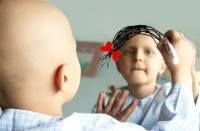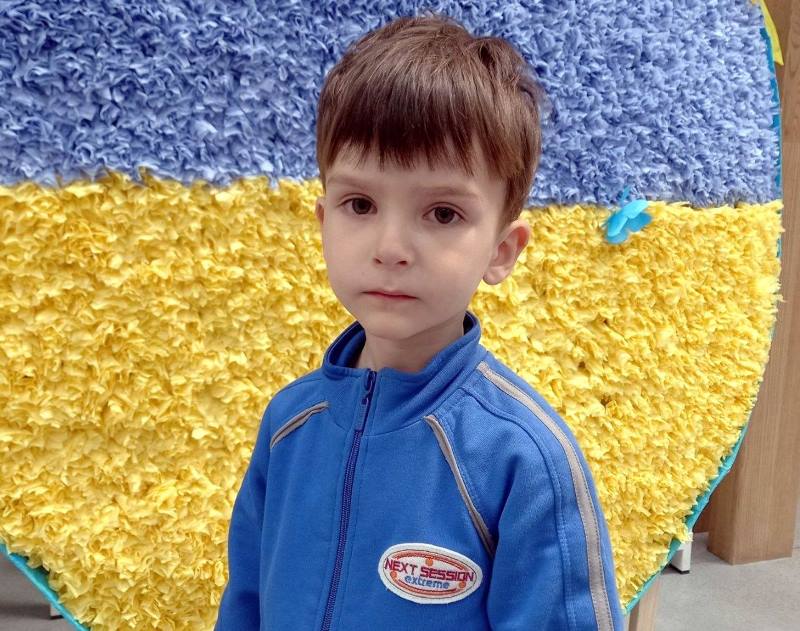Albert Pavlov is only 26. Along with his wife Ludmila and a few associates he is trying to help children from the orphanages of Ukraine. Albert, who works as an engineer and a programmer at the "Dneprostal" factory, devotes his Saturday afternoons to teaching children of the Orphanage House # 3 how to use the computer. He came to the editor's office today with 13 year old Vitia Barabanov, a boy who has lived with the Pavlov's family for over a year. Vitia has a younger brother Sasha, who also frequents Albert's apartment. Albert would really love to add him to their family too, if not the brutal bureaucratic procedures involved into becoming a foster parent. Something that Albert remembers all too well since the day they took Vitia into their home. Vitia Barabanov and Sasha Baranov's parents were deaf and mute. Nevertheless, both of the boys have no problems either hearing or speaking (not to mention that they are both "fluent" at sign language). The boys were transferred into the Orphanage House # 3 from another orphanage, where they have spent half a year. They are trying to forget what they've been through in their previous lives. Albert is convinced that the children's memory is good at blocking traumatic events, so as to protect the kid's psyche. May be that's why these children are frequently confused about the time.
Q. Albert, you and your friends are young, well educated and, actually, quite successful. Can you please tell us what made you undertake the burden as heavy as helping the underpriviledged children?
A. Everybody came to it in his own way. My first inclination surfaced when I was at 4th year of Engineering Academy. I started pondering: what's next? Say, one is learning, working (I was making some money on the side by working in retail), reading philosophy, speaking to the lofty Philosophy professor… And then what? I was hitchhiking, meeting a lot of esoteric people who existed beyond the standards of "normal living": they were selfless, merciful and were doing kind deeds… A lot of people were helping me while I was traveling in Crimea and Caucasus, expecting nothing in return. They were happy to give me a ride, to share their food, and to offer their homes for shelter. I felt like passing their kindness along to other people. There should be a circle of kindness, shouldn't there? In 2003 I met devote Christians Andrew and Marina Belokonny, who were helping the orphanages. My wife and I, along with some other people, started taking 1 or 2 kids for the weekends. We were traveling around, doing little trips to the Khortiza island, etc... I was teaching them how to use the computer.
Q. Are there any computers in the orphanages?
A. There are some now. Unfortunately, there is not enough of them. There is also no technologist on staff to maintain the equipment. Anyway, it's just a bunch of problems out there. We used to take quite a few kids with us to the lake Khortiza. The problem is that they become wild once they are in a large group. If you, however, take just one or two, they are ideal kids. In other words, you have to work with them individually. Altogether we've had about 20 children staying at our house. All of them were asking to come for a visit in order to use my computer. To take all of them home was impossible. This is why we've come up with the idea to find one computer for the orphanage, though we haven't the money. I had hoped that my company would give us an old outdated computer, but we had no luck. Then we have decided to broaden our "fundraising zone" and created the website www.deti.zp.ua. The first three months there was no response. But soon we started finding each other here in Zaporozhy and began working with people. Then one day a young lady from Kiev read our information on the internet and gave us her own computer. The most significant changes happened after we created the English version of our site.
Q. Did foreigners start helping?
A. First of all, there was a reply from the people who immigrated to United States. From people who immigrated from Zaporozhy. They started sending parcels with clothes, toys, money - 100, 200$. Thanks to their help we bought another computer and have even started the educational program: we pay tutors who come to the orphanage in order to teach some kids individually. Of interest, even the kids who were adopted abroad are helping us. One boy spoke about us at his american school, and now the kids from his class are raising some money, little by little, and sending it to us. We make regular financial statements where we report how every penny that we receive is spent. Any time we receive a parcel with presents, we make photo reports and display them on our site. We make announcements in Zaporozhy so that people can come to the orphanage personally and help the orphans. We are trying to attract attention to the problem of orphans. Unfortunately, there are many more promises than of the actual help. These promises are taking away a lot of our time.
Q. Are representatives of political parties helping you?
A. Not through our website. They come to the orphanage directly. They always bring TV representatives with them, so that everybody can observe their charitable activities. The Law School students visit regularly and organize competitions, the kids really like them. (plus Zaporozhstal' helps). However, we need much more help than that. Last year they started feeding kids somewhat better, and even bought a couple of computers, along with some other equipment. Presently we have 4 computers, but every child wants to learn how to use them. There are about 18 people squeezed in the computer room at any given moment. It's difficult to teach kids under these circumstances. That's why we are looking for tutor-volunteers, or may be for some money that can be used to hire teachers.
Q. But there is school, teachers…
A. These are not the regular children. Besides, their educational levels vary. Not such long time ago the older, almost adult boy brought in his 7 year old younger brother. No one knows where they were living before. The older one was pretty much unable to speak in a normal way, and the younger one could not speak at all. By the way, the younger brother turned out to be a very capable student. The tutor is giving him individual lessons, and he has even starting to read. As far as teaching and education are concerned, practically all these kids need individualized attention. Unfortunately, the conditions and the number of staff at the Orphanage House render this impossible. Let's just say that only in Orphanage House #3 there are roughly 140 kids aged between 7 and 16 (70% are boys). All of them did not come there from some marvelous backgrounds. They could really use some comfort …. They would like to read nice books, go to the movies, theatre shows, concerts… They need to be saved! What have they ever seen? The majority of them don't even have an idea of how to live a normal life; they can't think logically. They need psychologists, speech pathologists and, possibly even psychiatrists on staff. What can their female caregivers do with the teenagers who turn into a pack of wolves in their rooms at nights? They even called the police once, but the boys managed to flatten the tires on the police cars while policemen were trying to set some order. However, when they occasionally visit families, they turn into nice children, as there no one to impress out there. They all dream secretly about living in normal apartments with normal families.
Q. Are there not enough people willing to adopt children in order to solve this problem?
A. Children above 7 are rarely adopted even by the foreign citizens. As to people from Zaporozhya, even if there are some who would like to become foster or adoptive parents, they would have to deal with so much bureaucratic nonsense, that they are doomed to reconsider their intentions. Most of the businessmen don't want to deal with the problem either, thinking (rightly so) that they pay enough taxes to the state to deal with these problems. Not to mention that charities are not valued in our country, but rather the other way around…The majority of people do not trust the charitable organizations and fundraising companies, unwilling to pay the wages of workers of such enterprises. Because of it we only speak about people who need our help, and people who are willing to provide it may give it directly to a particular child. We don't have any offices for which we have to pay rent, and there is no staff of workers who need to be put on a payroll.
Q. You and Ludmila have a one and a half year old daughter, Masha. Was it difficult to start taking care of Vitia and his brother Sasha?
A. We've been living like this for a few years. And it's not only us, there are others. We are used to it. We are also helping each other. Vitia is doing his house chores very well. And he and his brother Sasha are quite happy to take care of Masha. If only he were that eager about doing his homework! He would rather do the dishes 10 times per night then his schoolwork. Every Wednesday we are teaching him some things: to speak properly, to read, to think logically…
Q. Could you tell us how responsibilities are shared in your organization?
A. We don't have responsibilities. All people are trying to do their best to help children. Lena and Ura Gorev, for example, do the emailing through the site, make reports about the use of money, do repairs in the Orphanage House, do whatever possible. They even invented and printed out the "pretend" currency that children can earn by getting a good grade in school or by making something nice with their hands. Then, using this "money" a child can "buy" something he likes from the mailed presents. They always have a few kids visiting their house, they take them hiking, traveling, they spend vacations together… They would like to create a foster home for a few children, but the city officials would not allow for it… Actually, there are not many people like them.
The interview was taken by Valentina Katrich.
Using the chance we would like to ask the readers to help the oprphanage houses with toys, books, bed linen, paints, albums. We need practically anything that could improve the impoverished orphanage's environment. For example, orphanage #3 still does not have a single couch or an armchair, and children live as if in a military base. We will be very grateful if businesses could help us with anything they can spare. What's even better, is if there are kind people out there, students, teachers, painters, musicians who can help to teach the kids a variety of things. We would be very grateful to anybody who may play a role in the life of a child, who can accept him into his family and give the warmth of his or her heart to the children who are deprived of everything.



